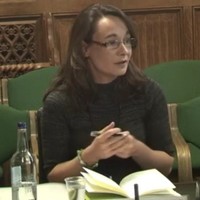
Katy Hayward
Dr Katy Hayward is Reader in Sociology and a Fellow of the Senator George J. Mitchell Institute for Global Peace, Security and Justice at Queen’s University Belfast.
Among other research projects, she was a research fellow on the FP5 EUBorderConf project on EU border conflicts (http://cordis.europa.eu/project/rcn/67119_en.html) and co-investigator of the RCUK-funded Tracing Risk and Uncertainty in Security Technologies (TRUST) project (http://gtr.rcuk.ac.uk/project/38EBDD4C-E69F-46E3-9237-B808AF599CEC). She is currently responsible for the Irish case study of the ‘Borders in Globalization’ project funded by the Canadian SSHRC (www.biglobalization.org)
Her notable publications include Irish Nationalism and European Integration (2009) and (as co-editor) Political Discourse and Conflict Resolution (2012), and Dynamics of Political Change in Ireland (2017).
Outside the University, she sits on the Boards of Conciliation Resources (http://www.c-r.org/), the Centre for Cross Border Studies (http://crossborder.ie/), and the Institute for Conflict Research (http://conflictresearch.org.uk/).
Phone: +44 28 9097 3189
Address: SSESW, QUB, 6 College Park, Belfast, Northern Ireland
Among other research projects, she was a research fellow on the FP5 EUBorderConf project on EU border conflicts (http://cordis.europa.eu/project/rcn/67119_en.html) and co-investigator of the RCUK-funded Tracing Risk and Uncertainty in Security Technologies (TRUST) project (http://gtr.rcuk.ac.uk/project/38EBDD4C-E69F-46E3-9237-B808AF599CEC). She is currently responsible for the Irish case study of the ‘Borders in Globalization’ project funded by the Canadian SSHRC (www.biglobalization.org)
Her notable publications include Irish Nationalism and European Integration (2009) and (as co-editor) Political Discourse and Conflict Resolution (2012), and Dynamics of Political Change in Ireland (2017).
Outside the University, she sits on the Boards of Conciliation Resources (http://www.c-r.org/), the Centre for Cross Border Studies (http://crossborder.ie/), and the Institute for Conflict Research (http://conflictresearch.org.uk/).
Phone: +44 28 9097 3189
Address: SSESW, QUB, 6 College Park, Belfast, Northern Ireland
less
InterestsView All (7)
Uploads
Papers by Katy Hayward
between communities. It shows how its chosen case study—parades and associated protests in north Belfast—exemplifies the most fundamental problem that endures in post-Agreement Northern Ireland, namely that political authority is not derived from
a common civic culture (as is the norm in Western liberal democracy) but rather that legitimacy is still founded on the basis of the culture of either one or the other community.
Haugaard’s reflections on authority and legitimacy are used to explore Northern
Ireland’s atypical experience of political conflict vis-a-vis the Western liberal democratic model. The Bourdieusian concepts of field illusio and doxa help to explain why it is that parading remains such an important political and symbolic touchstone in this society.
ideology is understood to be bound up intimately with
institutions and with everyday relationships at the local level. We introduce the contributions to this special issue, outlining the way in which they highlight the power of ideas, narratives, and microlevel solidarity in mobilization for violence and how they address the crucial importance of territoriality in linking ideas and action.
between communities. It shows how its chosen case study—parades and associated protests in north Belfast—exemplifies the most fundamental problem that endures in post-Agreement Northern Ireland, namely that political authority is not derived from
a common civic culture (as is the norm in Western liberal democracy) but rather that legitimacy is still founded on the basis of the culture of either one or the other community.
Haugaard’s reflections on authority and legitimacy are used to explore Northern
Ireland’s atypical experience of political conflict vis-a-vis the Western liberal democratic model. The Bourdieusian concepts of field illusio and doxa help to explain why it is that parading remains such an important political and symbolic touchstone in this society.
ideology is understood to be bound up intimately with
institutions and with everyday relationships at the local level. We introduce the contributions to this special issue, outlining the way in which they highlight the power of ideas, narratives, and microlevel solidarity in mobilization for violence and how they address the crucial importance of territoriality in linking ideas and action.